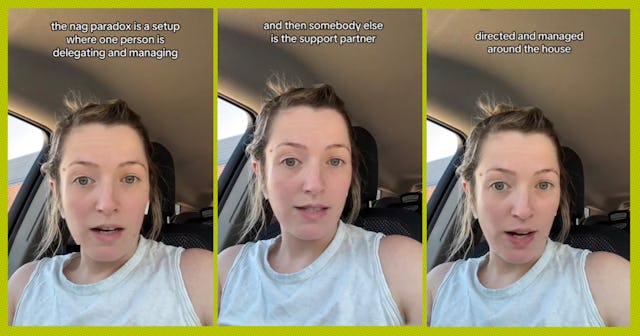TikToker Breaks Down "The Nag Paradox" That Creates Fights For So Many Couples
“You're not a nag for wanting partnership.”

One of the most common dynamics in a household relies on one person organizing, managing, and delegating while the other (sometimes reluctantly) follows suit. Educator and Time To Lean podcast host, Laura Danger, coined this household dynamic, “The Nag Paradox.”
Danger calls this “partnership” the Nag Paradox because while this partnership might seem like it would work (one person leads, the other follows), there are often communication issues and hurt feelings putting wrenches in the plan. Neither in the relationship is actually happy with how things are set up, leading to resentment, arguments, or even divorce.
Danger explains in her viral TikTok video that The Nag Paradox occurs when one person in the household is managing the tasks while the others is asking how they can help, without taking much initiative of their own. She calls this a “trap,” citing world-renowned relationship experts, doctors John and Julie Gottman.
She explains, “That's a bid for connection. The Gottmans call a bid for connection basically any time you invite somebody to join you. It can be, ‘Hey, I want you to go out to dinner with me.’ It can be, ‘Hey, I want to talk about the household. Let's collaborate. Let's clean together.’ It can just be like, ‘Hey, I want to talk about your day.’”
“And you can either turn toward ... You can join them, talk about them, be interested. You can straight up reject, or you can miss it. Rejecting or missing one of those bids is not good.”
Once bids are rejected repeatedly, Danger says, they will eventually stop altogether, creating not just physical but emotional distance.
Danger also mentions The Four Horsemen — a term referencing an image of the end times in the New Testament— that’s used in the Gottmans’ books to predict the end of a relationship.
“If they're present in your relationship, it predicts an ending to it,” Danger explains. “Two of those things are criticism and defensiveness, and they are baked in to The Nag Paradox.”
“One person is directing, delegating, telling you what to do. If you don't get it right or if something else needs to be done, they have to give feedback repeatedly. And then the other person is on the receiving end of repeated feedback about what they should be doing. If you are constantly on the receiving end of negative feedback or even just adjustments of things that you need to do better, it feels bad,” she continues.
“And you might start to feel like you as a person, your character, your quality as an individual is being, I don't undermine. You get protective. You defend yourself.”
These behaviors will lead to an eventual shutdown because no one wants to repeatedly ask for bids, and no one wants to feel defensive all the time. To combat this toxic and harmful paradox, Danger recommends couples sit down and talk about the mental load, delegate tasks out, use Fair Play methods. Danger says we need to stop normalizing this tired trope of a wife nagging and a husband reluctantly helping out around the house.
“The whole ‘honey-do list,’ being told what to do, bossed around, and then people who are upset about this are called nags, which just brushes off the value and the seriousness of this issue,” she says.
“Domestic labor matters. It runs our lives. The idea of nagging is that somebody's needlessly upset about something that doesn't matter. Domestic labor matters. Connecting with your partner matters. You're not a nag for wanting partnership.”
In Danger’s comment section, several people related to living in this paradox
“I stopped doing a lot of the things that bugged me and he picked them up after awhile of seeing them go undone. and now our workload is even after,” one user wrote.
Another wrote, “yes! this hits the spot we're dealing with because I know he wants to help but when I initiate that connection he MISSES THAT ITS A CONNECTION TRYING”
“My husband acts like doing the things I task him with is helping ME. Like no we BOTH LIVE HERE. you need to do stuff to cause it’s YOUR HOUSE,” another noted.
To learn more about The Nag Paradox, head to Danger’s blog.